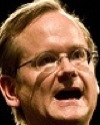
Only 9 percent of the electorate thinks the U.S. Congress is doing a good job. Lawrence Lessig talks about the damage that arises from politicians focusing on raising funds to get themselves reelected. This constant attention to making money feeds the Washington 'economy of influence'. The morally destitute behavior, foretold by Thomas Jefferson in The Founders' Constitution, undermines the trust of the electorate in the institution of the government.
The Congress have been known for feathering their own nests, voting themselves back into power, developing the sixth sense to get re-elected into tenure, since the 1770s. Barack Obama may fix the presidency in one fell swoop, but the core of the problem is not in the presidency. It is in the loss of trust. People have lost trust in the government because the integrity of politicians is compromised by bribery from influential lobbyists.
Lessig narrates Jefferson's words from The Founder’s Constitution, "They should look forward to a time, and that not a distant one …and purchase their voices and make them pay the price," and relates anecdotes of corruption from recent political history. He says the corrupt political system has soiled itself and has been increasingly responsible for undermining the faith of the republic in the government. The politicians have made the second job of making money their first job. They have succumbed to greed and become dependents on the bribe-offering lobbyists. This lack of independence has many costs, one of them being the complete loss of trust of the voter in the institution of the government.
Lawrence Lessig is a Professor of Law and John A. Wilson Distinguished Faculty Scholar at Stanford Law School. Professor Lessig is the chairman of the board of Creative Commons, founder of the school's Center for Internet and Society and a sits on the board of directors for the Electronic Frontier Foundation (EFF) and the Public Library of Science. In 2002, Lessig was named one of Scientific American's Top 50 Innovators, and the American Bar Association recently awarded him the Cyberspace Law Excellence Award.
From 1991 to 1997, Lessig was a professor at the University of Chicago Law School. He then became the Berkman Professor of Law at Harvard Law School. In 1999-2000, he was a fellow at the Wissenschaftskolleg zu Berlin before moving to Stanford in 2000.
Lessig teaches and writes in the areas of constitutional law, law and high technology, Internet regulation, comparative constitutional law, and the law of cyberspace. His book, Code, and Other Laws of Cyberspace, was published by Basic Books, and The Future of Ideas: The Fate of the Commons in a Connected World, is available from Random House. His most recent book, Free Culture: How Big Media Uses Technology and the Law to Lock Down Culture and Control Creativity, is now available online at www.free-culture.cc and from Penguin Press.
Resources
This free podcast is from our Web 2.0 Conference series.
For The Conversations Network:
Photo: Robert Scoble